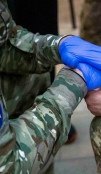EU action against Coronavirus

To find out more on the Coronavirus response, visit the constantly updated page of the European Commission here.
On 11 March Coronavirus was declared a pandemic by the World Health Organization (WHO). Almost three months after the first reported cases of infections in Wuhan (China), the outbreak of the new virus has taken a cross-border dimension that is seriously affecting global health security and economy. It is the time for rational and coordinated action based on science.
Working in close cooperation with the WHO and EU Member States, the European Union is taking its responsibilities. Member States of the EU are taking clear, tough measures, based on the best available scientific expertise. We also stepped up our coordination among Member States, first and foremost to deal with the health aspect of the crisis, which is the most urgent.
For a situation update, please follow the European Centre for Disease Prevention and Control (this link).
https://twitter.com/EU_Commission/status/1242834803277344769
What is the EU doing against Coronavirus within its borders?
“We will use all the tools at our disposal to make sure the European economy weathers this storm”, said the President of the European Commission, Ursula von der Leyen, after the EU leaders' videoconference on the response to the Coronavirus outbreak held on 10 March.
That day, the Commission received a mandate to further step up its response on all fronts and coordinate Member State actions. As a result, the EU has launched a “Corona Response Investment Initiative” that will mobilize up to €37 billion to support national health care systems, SMEs, labour markets and other vulnerable parts of economies.
In addition to this, the Commission has adopted a Temporary Framework that allows Member States to use the full flexibility foreseen under State aid rules to support the economy in the context of the COVID-19 outbreak. This ensures that sufficient liquidity remains available to businesses of all types and to preserve the continuity of economic activity during these difficult times.
On 2 April, the Commission launched a new initiative designed to protect jobs and workers affected by the COVID-19 outbreak - the temporary Support mitigating Unemployment Risks in Emergency (SURE) initiative. The SURE initiative will provide financial assistance of up to €100 billion in total to Member States in the form of loans granted on favourable terms. These loans will help Member States to cover the costs of the national short-time work schemes put in place to preserve employment and assist the self-employed during the crisis.
In order to counter the serious risks to the monetary union posed by the COVID-19 crisis, the European Central Bank (ECB) has announced the new Pandemic Emergency Purchase Programme (PEPP), an asset-purchase program to buy public and private-sector securities worth 750 billion euros. Together with the €120 billion decided on 12 March, the emergency stimulus amounts to 7.3% of euro area GDP. "Extraordinary times require extraordinary action. There are no limits to our commitment to the euro. We are determined to use the full potential of our tools", said ECB president Christine Lagarde.
Another important measure is the creation of a strategic rescEU stockpile of medical equipment (such as ventilators and protective masks) to help EU countries in the context of the COVID-19 pandemic. It counts with a total budget of €80 million.
The European Commission has also launched an advisory panel on COVID-19 composed of epidemiologists and virologists from different Member States to formulate EU guidelines on science-based and coordinated risk management measures.
In order to support urgently needed research, the EU will allocate €140 million of public and private funding for promising research projects on vaccines, diagnosis and treatment.
All these efforts are coordinated through the Coronavirus Response team launched on 2 March, which is composed of five commissioners: Janez Lenarčič, who is in charge of crisis management, Stella Kyriakides, in charge of health issues, Ylva Johansson, for border-related issues, Adina Vălean, in charge of mobility, and Paolo Gentiloni, for macroeconomic aspects.
European solidarity among Member States
Across the European Union, countries, regions and cities are stretching out a helping hand to neighbours, helping those most in need. For instance, France has donated 1 million masks to Italy and Germany has delivered 7 tons of medical equipment to Italy, including ventilators and anaesthetic masks, helping save lives. More than 200 intensive care patients from Italy and France are being taken care of in German, Austrian and Luxembourg hospitals. Here you can see the updated list of EU solidarity actions.




